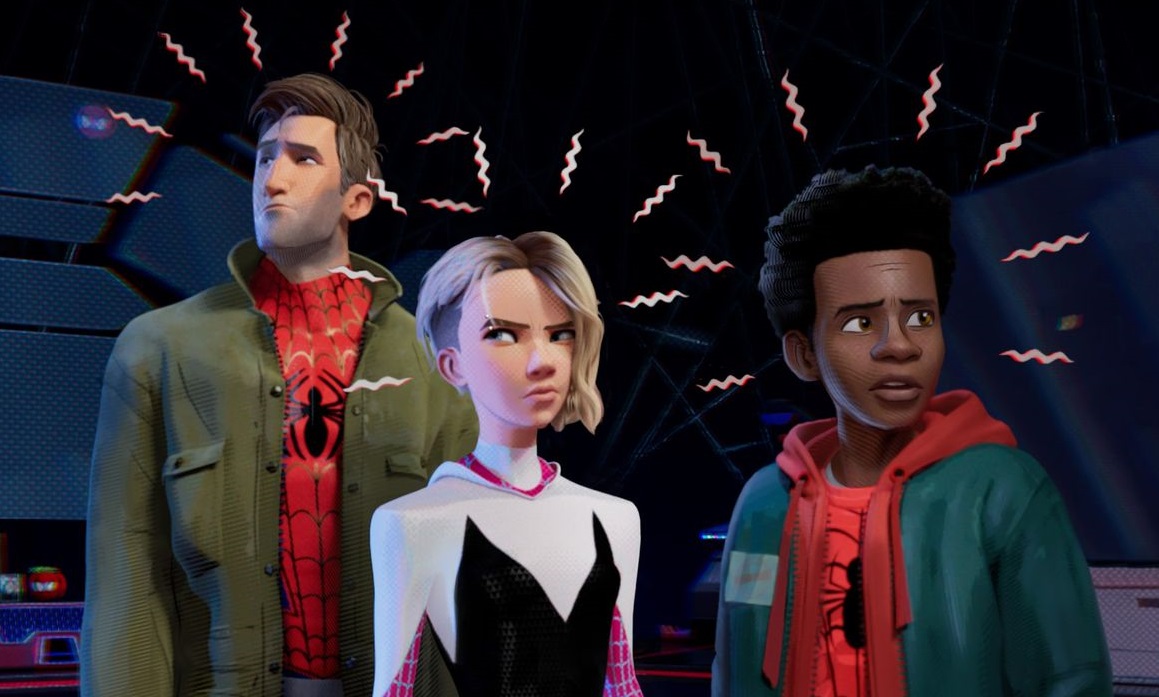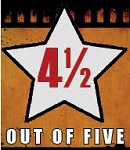

Spider-Man: Into the Spider-Verse feels like a movie that could exist only in 2018. In a year where Black Panther is the highest grossing movie in the U.S., Spider-Verse signifies an equally important moment for representation onscreen. It accomplishes this explicitly — in the form of Spider-Man himself, Miles Morales — and other times implicitly, coding the film with a powerful message that opens up the Spider-Man mythos to near endless possibilities. Beyond that, and across almost every conceivable metric, Spider-Man: Into the Spider-Verse is just really fucking good.
For starters, Spider-Verse is a dazzling, hyperkinetic experience on the big screen — blending familiar comic book imagery with a psychedelic visual style that feels altogether unique. It moves effortlessly between moments of intense action, raucous comedy, and painstaking heartache; taking viewers on an emotional roller coaster before dropping them off dizzied yet wholly satisfied. Spider-Verse isn't perfect. It sacrifices some narrative coherence in service of checking the necessary boxes inherent to modern comic-book blockbusters. But it's a testament to how great Spider-Verse is, moment to moment, that its few shortcomings are relatively insignificant to the larger film.
Peter Parker and Spider-Man debuted in 1962. It would take forty years for the character to reach the big screen. Concurrently, Miles Morales first appeared in comics in 2011. On the page, Miles came from an alternate universe (long story) where Peter Parker died (longer story), forcing Miles to take up the mantle of his fallen hero. In the seven years since his debut, fans have coalesced around Miles in a meaningful way, ensuring the character wouldn't have to wait forty years for an onscreen adaptation of his own. More broadly, the Spider-Verse refers to a wide array of alternate dimensions connecting characters like Miles, Peter, and a whole host of arachnid-centric heroes. Because comic books.
The filmmakers take a fair amount of liberties with Miles' origin. The broad strokes are all met before ripping the lid off on the titular Spider-Verse. Miles Morales (Shameik Moore) is a teenager being pulled in multiple directions. Like Peter, he possesses a relatable nerdiness coupled with a superior intellect, netting him the opportunity to attend one of NYC's premier high schools for the gifted. However, it's Miles' differences from Peter Parker that ultimately define his origins. Miles is half-Puerto Rican and half-black, attending a predominantly white school. Unlike Peter, Miles' family remains intact; his father is a dedicated member of the NYPD (Brian Tyree Henry) while his mother works as a hospital administrator (Luna Lauren Velez). One night, while doing some light graffiti with his uncle (Aaron, voiced by Mahershala Ali) in a mysterious, abandoned laboratory, Miles is bitten by a genetically-altered spider, giving him powers not unlike those of his hero, Spider-Man.
Because there's still an entire Spider-Verse to introduce, the movie quickly plays us through Miles' transformation (mostly for laughs) before launching into the larger story. Eventually, Miles' search for answers leads him to witness something unspeakable. Basically, Kingpin (Liev Schreiber, motivated by reasons revealed in the film) bankrolls the creation of alternate dimension-hopping supercollider. As it's being activated, Miles watches his universe's Spider-Man (Chris Pine) fall in battle. Recognizing Miles' powers and abilities, the dying Spider-Man tasks Miles with thwarting Kingpin once and for all. To do this, Miles will need to rely on the skills and talents of a ragtag band of heroes pieced together from various corners of the Spider-Verse.
If that sounds like a lot of set up, it kind of is. But it's lighter and quicker in the context of the film. Once the Spider-Verse is introduced, the movie gets into its groove, deftly using our preconceived notions to subvert viewer expectations and generate all kinds of laughs. We're introduced to an eclectic mix of Spider-heroes to help Miles on his journey. First, he meets a very alive Peter Parker(!). This Peter Parker/Spider-Man (Jake Johnson) is not dissimilar to the one from Miles' own dimension, save for a few extra years of cynicism and misfortune. If Miles' universe had "the good Spider-Man," Johnson's interpretation represents Spider-Man by way of Oscar Madison. Johnson's Parker is down-on-his-luck, grizzled, schlubby even. He's probably the most traditional Spider-character we meet, in the sense that all the elements of Peter Parker are there but mixed with traits of somebody who has spent too much time in the suit and taken away some of the wrong lessons. To be clear, I absolutely love this iteration of Peter Parker. In becoming a supporting player, Peter Parker is allowed more personal growth in this movie than ever before, and the character is better-served because of it.
From there, the movie introduces us to Gwen Stacy AKA Spider-Woman AKA Spider-Gwen (Hailee Steinfeld). Fighting alongside Miles and Peter, Gwen serves as the heart of the core trio. If Miles is the straight man and Peter the comedic relief, Gwen is the no-nonsense ass-kicker; anchoring the trio and providing the film with a character Sony will have no trouble spinning off into her own adventures.
Spider-Verse rounds out its super team with three of the oddest characters to ever grace the franchise. There's the anime-inspired Peni Parker (Kimiko Glenn), who, together with her pet radioactive spider, pilots a spider-like mech-suit (that was built by her dead father). There's Spider-Ham/Peter Porker (John Mulaney), a Looney Tunes-inspired take on Spider-Man that, if the name didn't already allude to, is a cartoon pig. Finally, there's Nicolas Cage as the Spider-Man Noir, who's like a cross between Spider-Man and the hard-boiled detective movies of the 1930s. It's as weird as it sounds. Rounding out the cast is Lily Tomlin as Aunt May, who hilariously serves as the team's quartermaster.
These ephemeral characters are played mostly for laughs, but they work to serve the larger goal of the story. Back in 2002, the concept of Spider-Man in pop culture was largely binary. In 2018, the sky is the limit. The makers of Spider-Verse understand that, for almost 60 years, readers have looked at Peter Parker/Spider-Man and seen themselves. The mask, covering the whole character's face, implied that literally anyone could be Spider-Man. Characters like Miles and Gwen (and even the talking pig) take this notion and amplify it, sling-shotting the franchise into modern times. It's an idea that Peter Parker would seemingly be very onboard with: Spider-Man is a symbol, bigger than any one person.
I mentioned that the film isn't perfect. Sony features its brand prominently and distractingly throughout. In addition, if I wasn't sick of Post Malone's "Sunflower" before Spider–Verse, I certainly am now. Finally, the concept of the Spider-Verse isn't very fleshed out. The film never provides a narrative reason for why all of these heroes with similar backgrounds and abilities are drawn together (the supercollider's creation is only tangentially connected with Spider-Man), and it lends a weightlessness to anything that isn't Miles' family drama. That said, the dramatic impact of this film comes almost entirely from what's affecting Miles outside of these Spider-Verse shenanigans. And it's a credit to actors Moore, Ali, and Henry that their extended melodrama is so effective and gut-wrenching. Spider-Verse strikes a lot of different tones throughout but, whenever it goes for the gut, it lands hard.
Spider-Man: Into the Spider-Verse creates possibilities that can go literally anywhere at this point (stay after the credits if you don't believe me). Its lore-building and rich character work transcend the genres it's playing in, paving the way for endless new Spider-Man adventures, both live-action and animated. It's worth noting that this is actually the second studio film to feature (and kill!) Spider-Man in 2018. When history looks back, it'll be Spider-Verse that redefined this franchise for the future. And that future looks very bright indeed.











